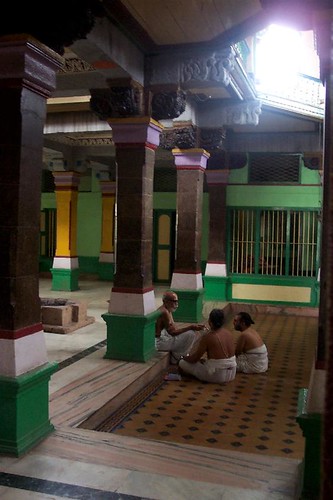A bicycle built for meKathmanduI rented a bike. wheee!! This is nothing new - I have rented push-bikes in Pondicherry, Pune, Tanjavore and BodhGaya, and Honda motor scooters in many places. But this is my first rental in Kathmandu (way, way over 'Du) and this time I rented a heavy "road bike" with wide tires to deal with the crap roads here in the city. Ramakrishna Cycles is a completly unpretentious cycle shop over on Sorakhutte near, but not in, Thamel. Dhruba, the shy kid from Dhading who helped me, rented me an aluminum-frame seven-speed bike. I took it for a week and he bargained a bit on the price, but I love it so much, I think I may have to buy one.
Dhruba offered tea to me and my friend Amy. We sat on the low Nepali woven-straw round stools (they look very African in design, come to think of it) behind the counter. Dhruba and his bike shoppe-mates appeared, and sounded like (from their soft voices and genuine smiles), a bit of unspoilt Nepal. That is, they didn't seem cynical and greedy from too much contact with corruption or gangster culture.
I asked Dhruba the standard opening question about his "native place." Dhading is a town just one hour or so outside Kathmandu, but for all its proximity, its living standards are very remote.
The bike makes locals assume you are filthy rich. If it was just an old made-in-India green push bike, I don't think anyone would notice. A nice multispeed road bike? I was *besieged* by waifs and, at the Kal Bhairav shrine, 'attendans' harassing and insisting that I give money to the god (this, while my hands were folded in prayer).
Anyway, unless you get out very, very early in the morning, the old back streets are useless on the bike - you have to get out and walk anyway. The big, ugly, open modern multi-lane roads are negotiable, but in Asian traffic, no one can hear you scream (or honk or pedal). A bell or horn is a definite must for survival!



 It's now available on Amazon.com and last week, was #1 on the Bestseller list of Crosswords (one of India's largest bookstore chains).
It's now available on Amazon.com and last week, was #1 on the Bestseller list of Crosswords (one of India's largest bookstore chains).